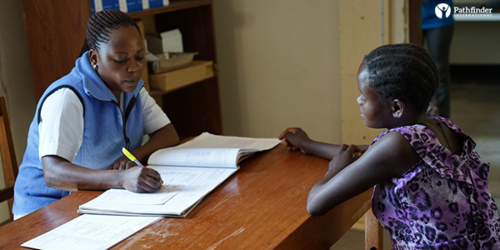Dissecting Bias
This blog post was originally published on October 23rd, 2017 by Tabinda Sarosh, Beyond Bias Project Director and Country Director, Pakistan, Pathfinder.
Photo credit: Pathfinder 2017
Today’s generation of adolescents and youth is the largest to come of age in history. Approximately 21 million 15-19 year old girls in developing countries become pregnant every year, and nearly half of these pregnancies (49%) are unintended. Twenty-three million adolescents would like to use contraception but are not. Clearly, achieving the FP2020 goal of enabling 120 million more women and girls to use contraception by 2020 requires a focus on adolescents. But, why are so many young people not using contraception?
Unfortunately, many young people face biased attitudes and disrespectful, judgmental behaviors on the part of providers that prevent them from accessing contraception. Our Beyond Bias project is working in communities in Burkina Faso, Pakistan, and Tanzania to examine provider bias and to design new approaches that will mitigate these biases and lead to better provider-client interactions for young people. As part of our research, we asked young people in these three countries to visit health clinics as mystery clients. Their experiences revealed some surprising results that defy three common myths about provider bias.
MYTH #1: HEALTH PROVIDERS DO NOT WANT TO SERVE YOUNG CLIENTS
It’s true that in many cases providers hesitated, or even refused, to provide our young mystery clients with contraception. But we discovered that it’s not necessarily due to a lack of will.
Health providers do not live in a vacuum. Rather, they are members of the broader community, and they can feel a great deal of pressure to abide by and uphold the social and gender norms of their communities. While many providers may want to serve their young clients, societal influences and pressures may be too great, or too ingrained, to overcome. As a Community Health Worker in Pakistan noted, “If she does agree [to take contraception], there isn’t much a provider can do in cases where the husband is adamant he will not allow contraception.”
Yet other providers were pragmatic about the needs of youth, saying, “When they’re coming here, they already have a sex life (Burkina Faso),” and some even took on a maternal or protective role in order to provide quality services. As a provider in Burkina Faso told one of our mystery clients, “It’s nice that you came here. Everything you say will be between us. You can consider me as your mother and if we meet outside here, we don’t have to say how we know each other.”
MYTH #2: ONCE YOUNG PEOPLE ARE MARRIED, GETTING CONTRACEPTION IS EASY
It’s certainly true that unmarried girls are up against considerable odds when they seek contraception. As a community health worker in Pakistan told us, “…unmarried girls are not clients.” But the challenge of accessing contraception does not end with marriage. In many countries, married couples are expected to have a baby soon after they get married in order to prove fertility (in the woman’s case) and virility (for the man). The woman’s mother-in-law often plays a large role in pushing for a child. A young Tanzanian woman told us,
“A newly married woman is expected to have her first child as soon as she enters wedlock. If that does not happen, she will be terribly embarrassed.”
We found similar attitudes in Pakistan, where a provider told one of our married mystery clients, “You don’t want a kid? It’s a blessing from God…It is better that you have one baby at least and then you can think about a gap….”
MYTH #3: YOUTH KNOW THEIR RIGHTS AND OPTIONS AND FEEL EMPOWERED TO TALK ABOUT CONTRACEPTION
As a provider in Pakistan noted, “Youth lack confidence and ability to first understand their sexual health needs, and then how to communicate them, and finally, to demand services they need from the provider.”
This lack of information and empowerment contributes to a lack of quality counseling and services for youth. For example, a newly married mystery client couple in Pakistan asked a provider for contraception. Rather than give them their preferred method, the provider advised them to have a baby first. We expected the couple to be angry, but instead they were complimentary, telling us, “The provider was very polite. She even offered us water.”
In these situations, young people may simply resign themselves to their current reality and the lack of access to critical reproductive health care. As a young woman in Burkina Faso told us:
“We have no power to make a decision and we don’t have the right to make a decision in our community.”
MOVING FORWARD
There is no one-size-fits-all answer to why young people are not accessing contraception. What’s clear is that addressing provider bias requires solutions more complex than simply training providers or ensuring commodities are available.
Considering this level of complexity, addressing provider bias requires new and multidisciplinary thinking. It requires deep understanding of provider bias and how it differs by circumstance, and a process that generates outside-of-the-box and scalable solutions that build on existing adolescent and youth sexual and reproductive health and behavior change evidence.
In collaboration with Camber Collective, YLabs, and the Center for Effective Global Action (CEGA), we are doing just that. We are digging into the problem with a multidisciplinary lens, to design better interventions and find scalable solutions that improve access to stigma free, respectful contraceptive services, regardless of age or marital status. Our young people deserve nothing less.
Beyond Bias increases contraceptive access and method choice for youth in the developing world. By bringing together providers and the young people they serve, Beyond Bias identifies scalable solutions that address provider bias and improve contraceptive counseling and services. Led by Pathfinder International, in collaboration with Camber Collective, YLabs, and CEGA, this three-year project is active in Pakistan, Tanzania, and Burkina Faso, with funding from the Bill & Melinda Gates Foundation.
